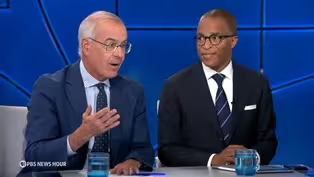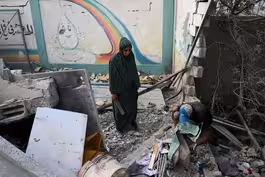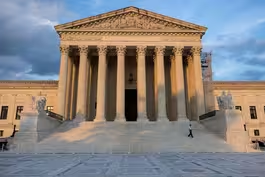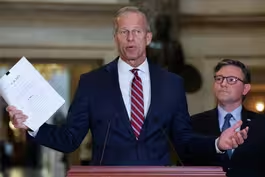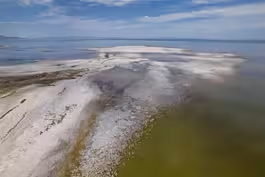
Shutdown puts further strain on air traffic control system
Clip: 10/3/2025 | 5m 9sVideo has Closed Captions
Shutdown puts further strain on already understaffed air traffic control system
Roughly 750,000 federal employees were furloughed when the government closed its doors. Not included in that number are the air traffic controllers who will continue to work, without pay, as long as the shutdown continues. That has raised concerns about the strain on an already understaffed and overworked cohort. Geoff Bennett spoke with Nick Daniels of the air traffic controllers' union.
Problems playing video? | Closed Captioning Feedback
Problems playing video? | Closed Captioning Feedback
Major corporate funding for the PBS News Hour is provided by BDO, BNSF, Consumer Cellular, American Cruise Lines, and Raymond James. Funding for the PBS NewsHour Weekend is provided by...

Shutdown puts further strain on air traffic control system
Clip: 10/3/2025 | 5m 9sVideo has Closed Captions
Roughly 750,000 federal employees were furloughed when the government closed its doors. Not included in that number are the air traffic controllers who will continue to work, without pay, as long as the shutdown continues. That has raised concerns about the strain on an already understaffed and overworked cohort. Geoff Bennett spoke with Nick Daniels of the air traffic controllers' union.
Problems playing video? | Closed Captioning Feedback
How to Watch PBS News Hour
PBS News Hour is available to stream on pbs.org and the free PBS App, available on iPhone, Apple TV, Android TV, Android smartphones, Amazon Fire TV, Amazon Fire Tablet, Roku, Samsung Smart TV, and Vizio.
Providing Support for PBS.org
Learn Moreabout PBS online sponsorshipGEOFF BENNETT: Roughly 750,000 federal employees# were furloughed on Wednesday when the government## closed its doors.
Not included in that# number, the more than 10,000 air traffic## controllers nationwide who will continue to work# without pay as long as the shutdown continues.
And that has raised concerns about the strain# on an already understaffed and overworked cohort## responsible for the safe transit of three# million American air travelers every day.
For more, we're joined by Nick Daniels.
He's# president of the air traffic controllers Union.
Thanks for being here.
NICK DANIELS, President, Nati.. me.
I appreciate it.
GEOFF BENNETT: So what kind of st.. are air traffic controllers under and# how is this shutdown making it worse?
NICK DANIELS: Air traffic controllers are known in# this country of having one of the most demanding## and one of the most high-consequence jobs in the# entire world.
They go to work day in and day out,## and five days is difficult enough.
They go to# work six on most occasions, having to work 60## hours a week, six days in that week, and then# ultimately only having four days off in a month.
And then you add in the uncertainty of# when you're going to get paid again and## a government shutdown on top of it, it's an# unnecessary distraction that shouldn't be## beared by the controllers that are doing# an amazing job for the American people.
GEOFF BENNETT: And few people can afford# to miss a paycheck.
You have warned that## air traffic controllers are having to pick up# second jobs.
I mean, how real a concern is that?
NICK DANIELS: American workers are the# same across.
Air traffic controllers## fall right in that same vein as# all the other American workers.
Most people are young, starting families, and they# don't have that residual income.
Or when you know## your stream of income isn't going to be there,# you have to start making very difficult decisions.
Now, I want to make sure it's completely# understood air traffic controllers are going## to show up and do their job that Americans want# every single day, which is keeping them safe.
But,## yes, when we had a 35-day government shutdown and# you saw that zero dollar paychecks were rolling## in and you needed to think about your family,# taking care of medical bills, making sure that## food was going to be on the table, some did# start having to drive for Uber on the side.
And that's something that Americans have said# we don't want our air traffic controllers## doing a side gig.
We want them doing their# primary job, and that's keeping people safe.
GEOFF BENNETT: Especially if they're# working 60 hours a week already.
NICK DANIELS: Especially if they're working 60# hours a week, because that means they're going## to their primary job in the day and having to pick# up a side job at night and then try to get rest.
And the government spent millions# of dollars to help with fatigue,## to help with unnecessary distractions.# We get regular training on these things,## yet a government shutdown# introduces every single one of them.
GEOFF BENNETT: The FAA says it's going to halt# the field training and the hiring during the## shutdown.
There's an academy in Oklahoma that# will stay open, but using last year's funds.
What's that mean for the# pipeline of new controllers?
NICK DANIELS: Air traffic controllers go# through a rigorous training at Oklahoma## City.
And I do commend Secretary Duffy,# Administrator Bedford.
They have come up## with a way that's never been done in the past to# ensure that Oklahoma City Academy does stay open.
Right now, we're only operating the system with# 10,800 controllers.
This shutdown exacerbates## and showing the issues of being critically# staffed, having unreliable equipment.
But,## ultimately, we have training that# goes on at our facility levels,## that 2,350 people are furloughed that usually help# conduct that training for air traffic controllers.
So, some training will get done.
All# the training won't.
And this example is## why these issues continue to rise in our# career field.
This stop-and-go funding,## government shutdowns, it just keeps putting# us further behind and the issue further out.
GEOFF BENNETT: And beyond the shutdown, we# have seen several safety lapses this past## year.
There was that deadly crash at Reagan# National.
There have been near misses.
There## was a runway collision just the other day# at La Guardia, repeated outages at Newark.
We know the system needs an overhaul, but is# enough being done to actually put fixes in place?
NICK DANIELS: For the first time in my# career, I have seen an actual investment## in air traffic control, $12.5 billion.# It's going to take about a $31 billion## investment to eventually get it done.# But we cannot slow down.
We cannot have## pauses like this that are going to# keep this problem going on longer.
We need the investment now.
We need to keep# the government open.
And that's our call.
So,## open the government, let us do the job# and let us get everybody to work so we## can truly bring the system up to the gold# standard that American people deserve.
GEOFF BENNETT: Can Americans feel safe flying# right now and if this shutdown drags on?
NICK DANIELS: People can feel safe flying,# but that's because of the men and women that## I represent, the air traffic controllers that# are shouldering this burden day in and day out.
They will go to work, they will do the amazing# job, they will move 35,000 flights a day,## three million people, the cargo associated# with it.
And every single day that this goes,## it's more stress on their back, it's an# unnecessary distraction that needs to end.
GEOFF BENNETT: We likely will, though,# see delays and some cancellations?
NICK DANIELS: Delays and cancellations happen# every day on a fragile system that's already## there right now.
And I think the hyper-focus# will be from the media during the shutdown,## and we will get to see, not because# of just the shutdown itself,## how fragile our system really is and# why we need to continue investing in it.
GEOFF BENNETT: Nick Daniels, president of the air# traffic controllers union, thanks for being here.
NICK DANIELS: Absolutely.
Thank you for having me.
Brooks and Capehart on shutdown and political dysfunction
Video has Closed Captions
Clip: 10/3/2025 | 12m 43s | Brooks and Capehart on political dysfunction and the government shutdown (12m 43s)
Hamas responds to Trump's Gaza peace proposal
Video has Closed Captions
Clip: 10/3/2025 | 4m 52s | Trump demands Israel end Gaza attack as Hamas responds to his peace proposal (4m 52s)
A look at cases the Supreme Court will take up in its term
Video has Closed Captions
Clip: 10/3/2025 | 8m 16s | A look at the major cases the Supreme Court will take up in its new term (8m 16s)
News Wrap: U.S. forces destroy another boat near Venezuela
Video has Closed Captions
Clip: 10/3/2025 | 4m 40s | News Wrap: U.S. forces destroy another suspected drug boat near Venezuela (4m 40s)
No end in sight for shutdown as Congress leaves for weekend
Video has Closed Captions
Clip: 10/3/2025 | 3m 13s | No end in sight for shutdown as Congress leaves for weekend (3m 13s)
The pawpaw: America's forgotten fruit finds new popularity
Video has Closed Captions
Clip: 10/3/2025 | 4m 40s | The pawpaw: America's forgotten native fruit finds new popularity (4m 40s)
Utah art project spotlights Great Salt Lake’s fragile future
Video has Closed Captions
Clip: 10/3/2025 | 7m 52s | Utah art project spotlights Great Salt Lake’s fragile future (7m 52s)
Providing Support for PBS.org
Learn Moreabout PBS online sponsorship
- News and Public Affairs

FRONTLINE is investigative journalism that questions, explains and changes our world.

- News and Public Affairs

Amanpour and Company features conversations with leaders and decision makers.












Support for PBS provided by:
Major corporate funding for the PBS News Hour is provided by BDO, BNSF, Consumer Cellular, American Cruise Lines, and Raymond James. Funding for the PBS NewsHour Weekend is provided by...
